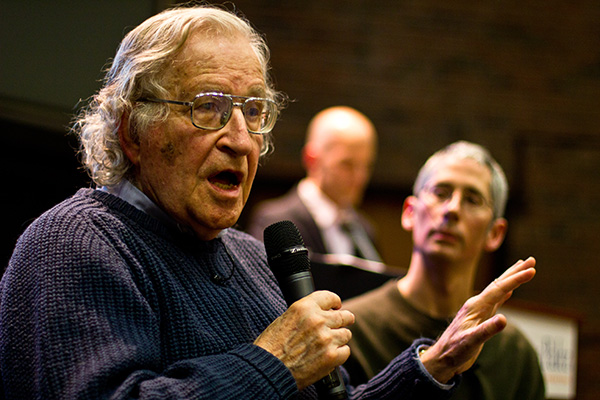
More than 1,300 people gathered in Lecture Center 100 and eight overflow rooms with live streams to hear editor Anthony Arnove and esteemed linguist and activist Noam Chomsky speak and honor historian Howard Zinn on Sunday, Dec. 4.
Zinn’s commemoration was thought up by community activist Mark Rausher and he, along with professor of anthropology Benjamin Junge, organized the lecture.
Junge felt Chomsky was an important speaker to speak at this event because of his prominence and strong political beliefs.
“Chomsky represents one of the most important voices in leftist critique today, and gives us a hard-driving and cogent perspective through which to think about foreign policy, the economic crisis, and how history is told,” Junge said. “Given many SUNY New Paltz students’ passions around these themes — especially in the context of the recent ‘Occupy’ protests — Chomsky’s appeal was a no-brainer.”
The event opened with an introductory speech by Junge, telling the order of the events and inviting attendees to submit questions on index cards for the question and answer session following the speeches.
Arnove spoke first, discussing Zinn’s impact and influence in addition to telling personal stories of experiences he had collaborating with Zinn. As much of the event did, Arnove focused on the “Occupy” movement and Zinn’s connection to it.
“It’s bittersweet to be in the movement of such possibility and upturn and struggle because Howard would have so loved to be among the people taking part in all these demonstrations and activities,” Arnove said. “He would have been so inspired by the creativity, by the dynamism, by the energy and it’s really very sweet to think about the fact that he can’t be here, but is still so present.”
Chomsky spoke to a variety of topics including health care, the environment, the “Occupy” movement and recalled memories of Zinn.
When discussing the “Occupy” movement, Chomsky said he was reminded of Zinn’s own words.
“There is a call to focus our attention on the countless small actions of unknown people that are the foundation for those great moments that ultimately enter the historical record.” Chomsky said this was illuminated in both his life and work and he “literally changed the consciousness and the conscience of an entire generation.”
He related Zinn’s quote to the movement as he said it is small actions by unknown people who are rising up that are important.
“These are the first real reactions, the first real challenge, the first effort to reverse what has been a severe assault on the general population of the United States and the past generation,” Chomsky said. “Counterparts of the world are reacting to quite similar assaults, major exercise of bitter class war that’s been worldwide.”
A question and answer period took place after the two men spoke, which was Chomsky’s own idea. Junge directed questions at the pair from Facebook and the present audience.
One question via Facebook asked them to comment on public higher education in the United States today and why college students need to know about Zinn.
“They have to know about Howard Zinn because of the nature of the work that he did and the life that he lived,” Chomsky said. “He lived a life consistently bringing forth the way in which people throughout history have struggled against injustice, suffered fates and kept fighting.”
Chomsky said he felt public higher education was better than it was 50 years ago when he said discussions such as the one at SUNY New Paltz would not have occurred. He spoke of the radical student movement and its struggles and elements.
Chomsky also compared education today to when he first got to his university, Massachusetts Institute of Technology (MIT), and how all students used to be obedient, well-dressed white males. He said now there are women and diverse groups of people informally dressed and “interested in everything.”
Event volunteer Danielle Kingsbury, who worked as an usher and collected question cards felt the event helped the school’s reputation and brought up prominent and pertinent issues.
“The lecture was important for the school because it has been a while since New Paltz held something this big, and we deserve a little recognition once in a while,” Kingsbury said. “I was grateful that Chomsky spent so much time discussing the ‘Occupy’ movement. I feel like it is really the beginning of something great, but the media is trying to portray it as just a bunch of hippies when it is actually everyone’s fight.”
Junge shared the sentiment and was very happy with the number of attendees who listened to the guests remember Zinn and tackle societal and humanitarian issues.
“We’re overjoyed at the enthusiasm and high attendance. The lectures — both by Arnove and Chomsky — were excellent,” Junge said. “Arnove gave a loving and compelling introduction to Howard Zinn, and Professor Chomsky gave his characteristic tour-de-force assault on the hypocrisy of U.S. foreign policy and on the problems facing struggles for social justice in today’s world.”
Junge said students are encouraged to posts photos, YouTube clips and reflections on the event page at http://on.fb.me/newpaltz-zinn.
